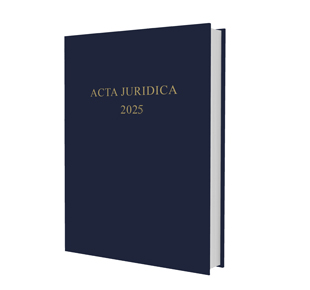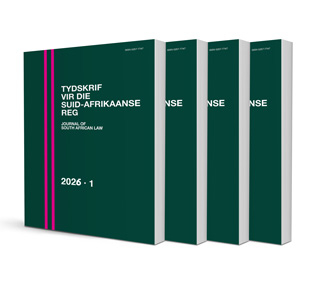Abstract
’n Bekentenis kan omskryf word as ’n omvattende erkenning buite die hof gedoen deur ’n beskuldigde in ’n strafsaak waarin hy of sy onomwonde skuld beken ten opsigte van die ten laste gelegde misdaad. Aangesien ’n bekentenis al die elemente van die misdaad dek, word dit oor die algemeen as ’n voldoende grondslag vir ’n skuldigbevinding beskou. Daar is egter sekere voorbehoude wat in ag geneem moet word. Westerse demokratiese regstelsels verg eerstens dat ’n bekentenis op ’n behoorlike wyse bekom moes wees, wat meebring dat dit minstens vrywilliglik afgelê moes wees, ten einde toelaatbaar te wees. Tweedens vereis sommige jurisdiksies dat ’n bekentenis wat toelaatbaar bevind is, slegs as grondslag van ’n skuldigbevinding kan dien mits die inhoud daarvan andersins gestaaf word of, so nie, indien daar getuienis buite die bekentenis is wat bewys dat die ten laste gelegde misdaad só gepleeg is. Laasgenoemde vereiste staan bekend as die corpus delicti-reël, wat letterlik beteken die “liggaam van die misdaad”.
Die oogmerk met hierdie vereistes is om die gevaar uit te skakel of minstens te verminder dat ’n vals bekentenis as grondslag vir ’n skuldigbevinding gebruik word. Regspraak in Engeland en die Verenigde State van Amerika (VSA) het sedert die sewentiende eeu aangetoon dat mense soms vals bekentenisse maak. Daar is verskeie redes hiervoor, onder andere ’n verdagte wat verdere aggressiewe ondervraging deur die polisie wil vermy of wat ’n familielid of geliefde wil beskerm deur die aanspreeklikheid op hom of haar te neem en ’n persoon wat geestesonstabiel is en wat sodoende publisiteit soek. In hierdie artikel word ’n regsvergelykende studie gedoen van die posisie in Engeland, Skotland, die VSA, Australië en Suid-Afrika met betrekking tot die stawing van bekentenisse, insluitende die corpus delicti-reël.
Die stawingsvereiste en die corpus delicti-reël behoort ter sprake te kom tydens die evaluering van getuienis aan die einde van die verhoor, wanneer die hof oorweeg of die beskuldigde se bekentenis ’n voldoende grondslag vir ’n skuldigbevinding bied. Teen daardie tyd is die bekentenis reeds toelaatbaar bevind en is die toelatingsvereistes nie meer ter sake nie. Hierdie onderskeid tussen die toelaatbaarheid en evaluering van ’n bekentenis word in die Suid-Afrikaanse reg gehandhaaf, maar dit is nie die posisie in die ander jurisdiksies onder bespreking nie. Die konsepte “toelaatbaarheid” en “evaluering van bekentenisse” word dikwels saamgesmelt en die stawingskonsep word ook in die betekenis van die toelaatbaarheid van bekentenisse gebruik.
In Engeland is die fokus hoofsaaklik op die toelaatbaarheid van bekentenisse, wat informele erkennings insluit. In wese gaan dit oor die vrywilligheidsvereiste, maar die betroubaarheid van ’n verklaring speel ook ’n rol. Dit lei tot verwarring want betroubaarheid kom eintlik ter sprake by evaluering van bekentenisse.
In Skotland geld ’n algemene stawingsvereiste ten opsigte van misdade in die algemeen. Dit beteken dat die feite in geskil deur twee onafhanklike bronne van getuienis bewys moet word. Die vervolgingsgesag moet dus bewys dat die betrokke misdaad gepleeg is én dat die beskuldigde die oortreder was. Beide elemente moet dan deur twee onafhanklike bronne van getuienis gestaaf word. Indien die vervolging op ’n bekentenis steun, moet die bekentenis deur onafhanklike getuienis gestaaf word. Getuienis van die corpus delicti is nie opsigself voldoende om aan die stawingsvereiste te voldoen nie.
In die Verenigde State van Amerika is die posisie baie verwarrend. Sommige bronne behandel die corpus delicti-beginsel in die konteks van sowel die toelaatbaarheid as die evaluering van bekentenisse. Ander bronne verwys daarna as uitsluitlik ’n toelaatbaarheidsvereiste. Enkele bronne behandel dit as ’n vereiste rakende die evaluering van bekentenisse. Na my mening is daar weinig leiding te vind in die Amerikaanse bronne.
Die fokus in al die verskillende jurisdiksies in Australië val op die toelaatbaarheid van informele erkennings, wat bekentenisse insluit. Sedert die uitspraak van die hoë hof in McKinney v R is wetgewing in al die jurisdiksies aangeneem wat in die algemeen vereis dat erkennings en bekentenisse afgelê in polisie-aanhouding gestaaf moet word deur ’n audio-visuele of elektroniese opname. Die begrip stawing word dus hier in die betekenis van die toelaatbaarheid van bekentenisse gebruik. Nie een van die Australiese jurisdiksies vereis stawing van die inhoud van ’n bekentenis om as grondslag van ’n skuldigbevinding te kan dien nie. Die stawingsvereiste is dus gefokus op die omstandighede met die maak van ’n bekentenis en nie op die inhoud daarvan nie.
Teen die voorgaande agtergrond meen ek dat die Suid-Afrikaanse posisie op ’n goeie grondslag gevestig is. Daar word ’n duidelike onderskeid getref tussen enersyds die vereistes betreffende die toelaatbaarheid van bekentenisse en die stawing van sodanige verklarings andersyds. Wat laasgenoemde betref, word vereis dat ’n bekentenis in ’n wesenlike opsig bevestig moet word of, so nie, dat getuienis buite die bekentenis moet bewys dat die betrokke misdaad só gepleeg is. Die enigste kritiek daarteen is dat die onderskeid tussen informele erkennings en bekentenisse kunsmatig en onnodig is. Beide is inkriminerende verklarings en, met inagneming van die grondwetlike bepalings, behoort dieselfde vereistes betreffende toelaatbaarheid ten opsigte van albei te geld.

